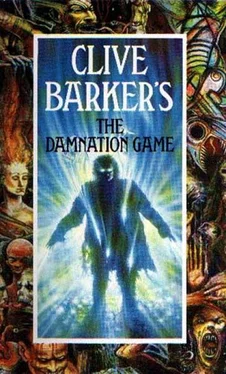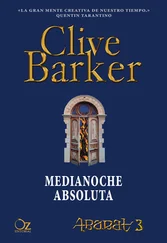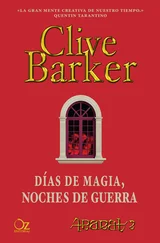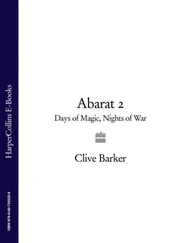Clive Barker - The Damnation Game
Здесь есть возможность читать онлайн «Clive Barker - The Damnation Game» весь текст электронной книги совершенно бесплатно (целиком полную версию без сокращений). В некоторых случаях можно слушать аудио, скачать через торрент в формате fb2 и присутствует краткое содержание. Жанр: Ужасы и Мистика, на английском языке. Описание произведения, (предисловие) а так же отзывы посетителей доступны на портале библиотеки ЛибКат.
- Название:The Damnation Game
- Автор:
- Жанр:
- Год:неизвестен
- ISBN:нет данных
- Рейтинг книги:4 / 5. Голосов: 2
-
Избранное:Добавить в избранное
- Отзывы:
-
Ваша оценка:
- 80
- 1
- 2
- 3
- 4
- 5
The Damnation Game: краткое содержание, описание и аннотация
Предлагаем к чтению аннотацию, описание, краткое содержание или предисловие (зависит от того, что написал сам автор книги «The Damnation Game»). Если вы не нашли необходимую информацию о книге — напишите в комментариях, мы постараемся отыскать её.
The Damnation Game — читать онлайн бесплатно полную книгу (весь текст) целиком
Ниже представлен текст книги, разбитый по страницам. Система сохранения места последней прочитанной страницы, позволяет с удобством читать онлайн бесплатно книгу «The Damnation Game», без необходимости каждый раз заново искать на чём Вы остановились. Поставьте закладку, и сможете в любой момент перейти на страницу, на которой закончили чтение.
Интервал:
Закладка:
"I think it's time I gave you more leash, Strauss," he said. "You've done a fine job so far. I'm pleased."
"Thank you, sir."
"Bill Toy will be up here overnight tomorrow, and so will Luther, so this might be an opportunity for you to go down to London."
It was eight weeks, almost to the day, since he'd arrived at the estate: and here, at last, was a tentative signal that his place was secure.
"I've had Luther sort out a vehicle for you. Speak to him about it when he arrives. And there's some money on the desk for you-"
Marty glanced across at the desk-top; there was indeed a pile of notes there.
"Go on, take it."
Marty's fingers fairly itched, but he kept control of his enthusiasm.
"It'll cover petrol and a night in the city."
Marty didn't count the notes; simply folded them and pocketed them.
"Thank you, sir."
"There's an address there too."
"Yes, sir."
"Take it. The shop belongs to a man called Halifax. He supplies me with strawberries, out of season. Will you pick up my order, please?"
"Of course."
"That's the only errand I want you to run. As long as you're back by midmorning Saturday, the rest of the time's your own."
"Thank you."
Whitehead's hand reached out for the glass of vodka, and Marty thought he was going to turn and look at him; he didn't. This interview was apparently over.
"Is that all, sir?"
"All? Yes, I think so. Don't you?"
It was many months since Whitehead had gone to bed sober. He'd started to use vodka as a soporific when the night terrors began; at first just a glass or two to dull the edge of his fear, then gradually increasing the dosage as, with time, his body became immune to it. He took no pleasure in drunkenness. He loathed putting his spinning head down on the pillow and hearing his thoughts whine in his ears. But he feared the fear more.
Now, as he sat watching the lawn, a fox stepped across the threshold of the floodlights, blanched by the brilliant illumination, and stared at the house. Its stillness lent it perfection; its eyes, catching the light, gleamed in its pricked head. It waited a moment only. Suddenly it seemed to sense danger-the dogs perhaps-and it turned tail and was gone. Whitehead still watched the spot it had disappeared from long after it had loped away, hoping against hope that it would come back and share his solitude for a space. But it had other business in the night.
There was a time when he'd been a fox: thin and sharp; a night wanderer. But things had changed. Providence had been bountiful, dreams had come true; and the fox, always a shape-changer, had grown fat and easy. The world had changed too: it had become a geography of profit and loss. Distances had shrunk to the length of his command. He had forgotten, with time, his previous life.
But of late he remembered it more and more. It came back in brilliant but reproachful detail, when the events of the day before were a fog. But he knew in his heart of hearts there was no way back to that blessed state.
And forward from here? That was a journey into a hopeless place, where no signpost would point him right or left-all directions being equal there-nor would there be hill or tree or habitation to mark the way. Such a place. Such a terrible place.
But he wouldn't be alone there. In that nowhere he would have a companion.
And when, in the fullness of time, he set his eyes on that land and its tenant he would wish, oh Christ how he would wish, that he had stayed a fox.
III The Last European
Anthony Breer, the Razor-Eater, returned to his tiny flat in the late afternoon, made himself instant coffee in his favorite cup, then sat at the table in the failing light and started to tie himself a noose. He'd known from early morning that today was the day. No need to go down to the library; if, in time, they noticed his absence and wrote to him demanding to know where he was, he wouldn't be answering. Besides, the sky had looked as grubby as his sheets at dawn, and being a rational man he'd thought: why bother to wash the sheets when the world's so dirty, and I'm so dirty, and there's no chance of ever getting any of it clean? The best thing is to put an end to this squalid existence once and for all.
He'd seen hanged people aplenty. Only photographs, of course, in a book he'd stolen from work about war crimes, marked "Not for the open shelves. To be issued only on request." The warning had really got his imagination working: here was a book people weren't really meant to see. He'd slipped it into his bag unopened, knowing from the very title-Soviet Documents on Nazi Atrocities-that this was a volume almost as sweet in the anticipation as in the reading. But in that he'd been wrong. Mouthwatering as that day had been, knowing that his bag contained this taboo treasure that delight was nothing compared to the revelations of the book itself. There were pictures of the burned-out ruins of Chekhov's cottage in Istra and others of the desecration of the Tchaikovsky residence. But mostly-and more importantly-there were photographs of the dead. Some of them heaped in piles, others lying in bloody snow, frozen solid. Children with their skulls broken open, people lying in trenches, shot in the face, others with swastikas carved into their chests and buttocks. But to the Razor-Eater's greedy eyes, the best photographs were of people being hanged. There was one Breer looked at very often. It pictured a handsome
young man being strung up from a makeshift gallows. The photographer had caught him in his last moments, staring directly at the camera, a wan and beatific smile on his face.
That was the look Breer wanted them to find on his face when they broke down the door of this very room and found him suspended up here, pirouetting in the breeze from the hallway. He thought about how they would stare at him, coo at him, shake their heads in wonder at his pale white feet and his courage in doing this tremendous thing. And while he thought, he knotted and unknotted the noose, determined to make as professional a job of it as he possibly could.
His only anxiety was the confession. Despite his working with books day in, day out, words weren't his strongest point: they slipped away for him, like beauty from his fat hands. But he wanted to say something about the children, just so they'd know, the people who found him and photographed him, that this wasn't a nobody they were staring at, but a man who'd done the worst things in the world for the best possible reasons. That was vital: that they knew who he was, because maybe in time they'd make sense of him in a way that he'd never been able to.
They had methods of interrogation, he knew, even with dead people. They'd lay him in an ice room and examine him minutely, and when they'd studied him from the outside they'd start looking at his inside, and oh! what things they'd find. They'd saw off the top of his skull and take out his brain; examine it for tumors, slice it thinly like expensive ham, probe at it in a hundred ways to find out the why and how of him. But that wouldn't work, would it? He, of all people, should know that. You cut up a thing that's alive and beautiful to find out how it's alive and why it's beautiful and before you know it, it's neither of those things, and you're standing there with blood on your face and tears in your sight and only the terrible ache of guilt to show for it. No, they'd get nothing from his brain, they'd have to look further than that. They'd have to unzip him from neck to pubis, snip his ribs and fold them back: Only then could they unravel his guts, and rummage in his stomach, and juggle his liver and lights. There, oh yes, there, they'd find plenty to feast their eyes on.
Maybe that was the best confession then, he mused as he retied the noose one final time. No use to try to find the right words, because what were words anyway? Trash, useless for the hot heart of things. No, they'd find all they needed to know if they just looked inside him. Find the story of the lost children, find the glory of his martyrdom. And they'd know, once and for all, that he was of the Tribe of the Razor-Eaters.
Читать дальшеИнтервал:
Закладка:
Похожие книги на «The Damnation Game»
Представляем Вашему вниманию похожие книги на «The Damnation Game» списком для выбора. Мы отобрали схожую по названию и смыслу литературу в надежде предоставить читателям больше вариантов отыскать новые, интересные, ещё непрочитанные произведения.
Обсуждение, отзывы о книге «The Damnation Game» и просто собственные мнения читателей. Оставьте ваши комментарии, напишите, что Вы думаете о произведении, его смысле или главных героях. Укажите что конкретно понравилось, а что нет, и почему Вы так считаете.








